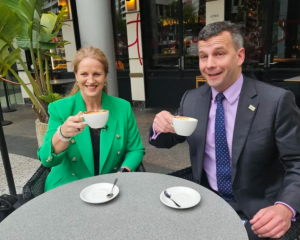
However, before public meetings next week in Waimate and Glenavy, near where the plant is proposed, South Island Resource Recovery Ltd (SIRRL) director Paul Taylor said any emissions would be well-monitored at the plant, and safe.
"This is a real and genuine concern of locals and of every New Zealander at the moment. The plant itself, the emissions that come out of the stack will be monitored in ‘real time’, and it will be possible for anybody to go online and check what’s coming out of the stack and be able to gauge that against our standards ... We’re setting the benchmark very high."
SIRRL director Herman Sioen, of Belgium, who is in New Zealand for the first time before the meetings, said on-site air quality testing was proposed to follow European legislation.
The plant would systematically measure "a long list" of substances online.
Further substances, which for technical reasons could not be measured online, would be measured through regular sampling, he said.

The plants together accepted 1.5million tonnes a year, about the amount of waste produced by the South Island in a year now.
Waste-to-energy plants began in Germany and the Netherlands after World War 2, he said.
They were first established in Belgium in the 1970s.
The first project he worked on as an engineer was in his hometown of Ghent, Belgium, in 1995.
The plant there was built close to the city centre and produced electricity and steam.
The steam, in particular, was supplied to a large university hospital on the other side of the road.
It used the steam to heat the rooms and to sterilise the equipment, he said.

"And nobody has any issues with it."
Waste-to-energy plants were common not just in Belgium. Other European countries relied on them as landfills fell out of favour.
Paris had a few large waste-to-energy plants around the city that supplied electricity to the local system, he said.
"When you visit Paris as a tourist and you take a shower in the morning, it is most likely heated with the waste that you produced the day before."
The country had been at "full capacity" for waste-to-energy plants for years with no influence on local zero-waste goals, Mr Sioen said.
There was a higher recycling rate there than in New Zealand, he said.
Mr Taylor said as a byproduct of the process, the 365,000 tonnes of waste the Glenavy plant was proposed to process annually would then produce about 80,000 tonnes of "bottom ash".
Internationally, that material was used as aggregate for roading, construction materials, concrete and similar.
"We’re having conversations with potential users of that product at the moment, but for the purposes of our resource consent application, we’re considering it all to be landfilled at this point. The bottom line is we hope to be able to use it down the track."
However, "fly ash" was also created and was potentially more harmful.
"Historically, that material has to be encased in concrete and deposited into specifically designed landfills."
In the Glenavy proposal, a "plasma treatment" of the fly ash had been proposed. It would be converted into a molten material which when cooled could be crushed and left as an inert material, which could be added to the bottom ash.
The plant would accept "normal municipal waste" and no hazardous materials.
The proposal has not been without controversy and Mr Taylor said he was aware protests had been planned for the public meetings.












